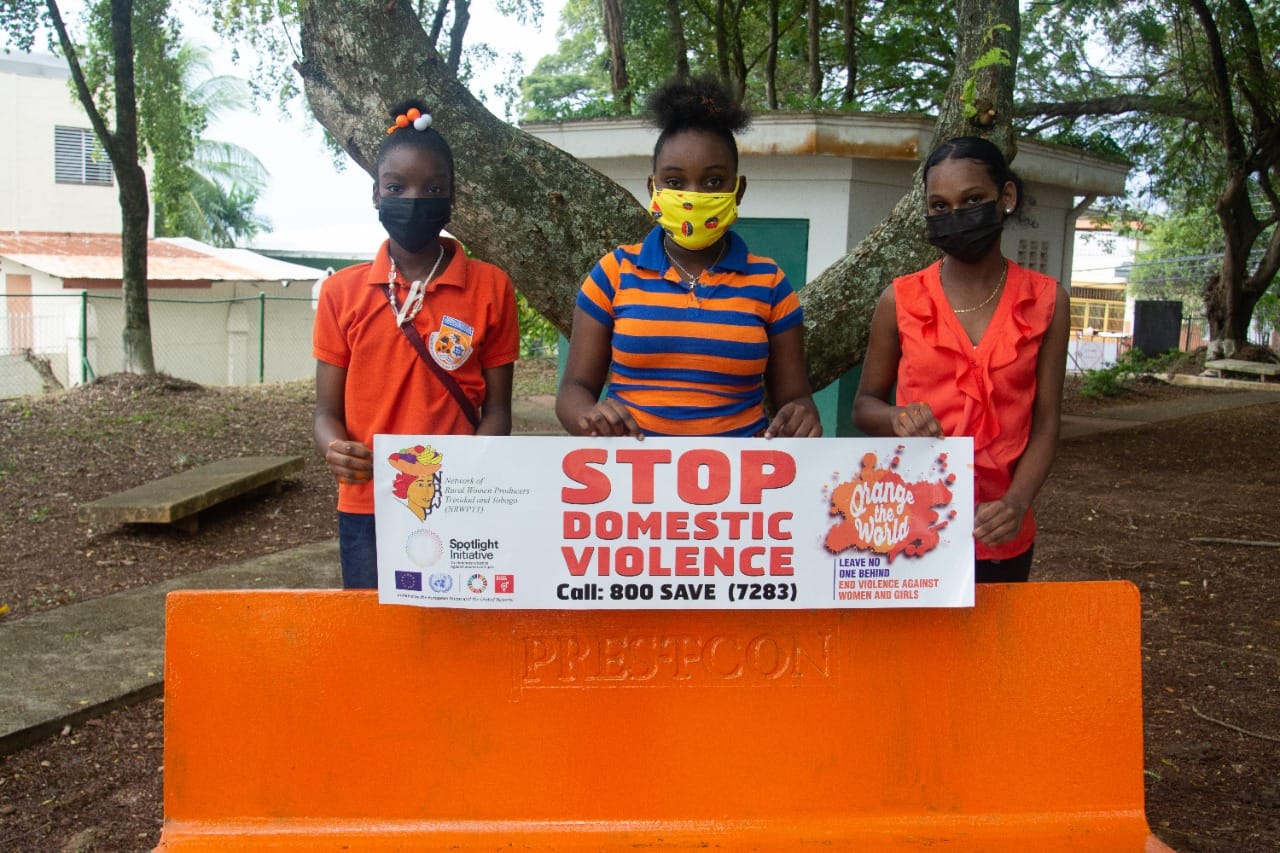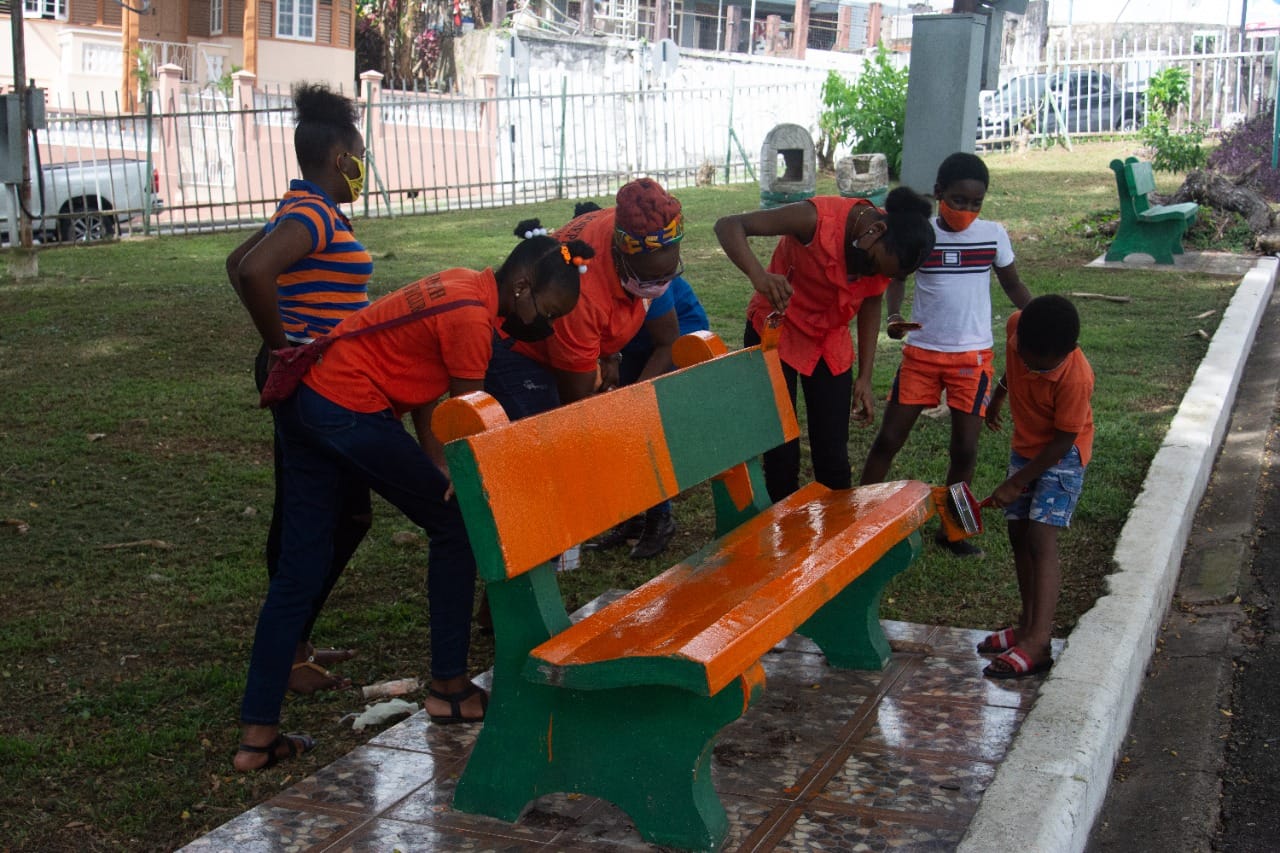Building a Strong Foundation for Trinidad and Tobago Young People to Escape from Gender-based Violence
Date:
The UN Women Foundations youth gender-based violence prevention programme is one of the activities being implemented with the support of the European Union-United Nations Spotlight Initiative to end violence against women and girls.
“The Foundations Programme was an eye-opening experience to me. The facilitators spoke on a number of topics surrounding gender and sexual gender-based violence. I felt empowered by the information that was given. It caused me to look at my life, that of my family, the police youth clubs and community at large and I observed the many gender stereotypes slowly being transformed. The information that I was given, I am eager to share to help empower others as I have done in my own life, as I am now an entrepreneur in the agricultural sector, growing and selling plants.”
– Sherine Supersad, 18 years.

Photo compliments Network of Rural Women Producers of Trinidad and Tobago
Sherina Supersad and Rondell Constantine are two of over 1,300 young people who went through the UN Women Foundations gender-based violence prevention programme for youth and shared on its benefits for them and others.
Foundations is coordinated as one of the activities under the European Union-United Nations Spotlight Initiative to end violence against women and girls. It is being implemented by UN Women Civil Society partner - the Network of Rural Women Producers of Trinidad and Tobago (NRWPTT) in association with the Trinidad and Tobago Police Service (TTPS) Youth Clubs network and the TTPS Victim and Witness unit.
Sherina who through Foundations-associated training was also able to expand her knowledge as an entrepreneur said the programme was particularly rewarding since she was now able to see the endless possibilities before her.
“What stood out as a highlight to me was the unified approach for the dissolution of gender stereotypes. Society still struggles with dealing with gender stereotypes and this programme has pushed the limitations to these stereotypes. I can be more than a homemaker… Foundations showed me that men and women can both do anything,” Sherina explained.
Rondell Constantine said he benefitted from the programme; learning that there are many types of violence, such as physical, mental and emotional abuse. He described the striking impact of one of the activities - exploring the harmful cultural gender norms in a popular local song:
“…it talks about young men especially in this society who don’t really have an education, they found somebody who they love and they don’t have the necessary requirements such as the money to buy food, clothing or shelter, or other necessities for women. It showed that those who don’t have any social status would always be looked down upon by those higher than them…“As a result of all this I am furthering my education at the moment ….”
NRWPTT Foundations co-coordinator Curtis Mayers said the group discussions, role-play and facilitator-led training helped participants get a deeper understanding of how gender stereotypes could be harmful to men and women: “One of the achievements that was quite noteworthy, was that they got a better understanding of gender stereotypes and how to treat with those issues and be able to promote the concept of gender equality... You could feel that they felt more empowered.”

Photo compliments Network of Rural Women Producers of Trinidad and Tobago
As part of the TTPS Mayaro Police Youth Club, Rondell explained they were able to take their message to the community: “On the 25th of every month, we painted the walls on the Mayaro junction which highlighted the kinds of gender-based violence going on in the community.”
NRWPTT President Gia Gaspard Taylor explained that while Foundations is a youth GBV-prevention progamme, the impact of GBV has broader implications for the household and communities. She said there was incest, rape and poverty within the family unit and so there was need to incorporate every member of the family, men, women, boys and girls.
Ms. Gaspard-Taylor noted the link between addressing GBV-related trauma and facilitating economic empowerment. “What we also realised having gone through the experience of having members triggered by something said in the training, was that we had to introduce other activities (sic) to promote economic empowerment, so we introduced a farmer-to-farmer programme because some of the parents who were also victims, were unemployed.”
NRWPTT facilitated training with the University of the West Indies (UWI) St Augustine campus, the US-based Purdue University and the Ministry of Agriculture to establish community gardens among other key outcomes. “We got a lot of donations from the Ministry, seeds, seedlings and plants, and got donations from private sector, So survivors were able to plant, reap and sell their produce and so they were able to earn”, Ms. Gaspard-Taylor added.
Mr. Mayers explained that the Spotlight-facilitated Foundations training strategically aligned with their work for women to achieve economic empowerment through entrepreneurial action. They would not only see their business as “a hustle” but a long-term sustainable activity, a route by which they could assert themselves and achieve economic independence and move out of situations of GBV.
He added: “This part of the Spotlight Initiative was fortuitous because it fit in so nicely with the work we were already engaged with and afforded us the opportunity to reach out to a wider community to engage other parties and compensate them; it was a real shot in the arm for us. The task is not complete, this is an ongoing process – some of the issues we are treating with, this will be a part of the longitudinal study, this is a phase with this particular segment.”
Both Sherine and Rondell endorsed the programme for their peers with Rondell adding that bullying also needed to be included as a topic: “It taught me, that those who are going through those types of violence, whatever problem, they have, they can overcome it ....”